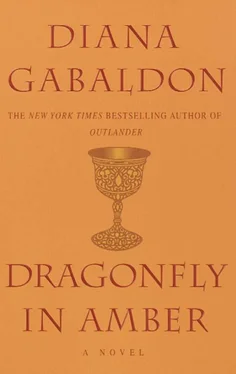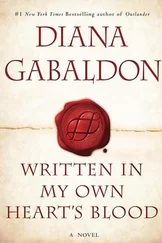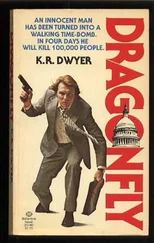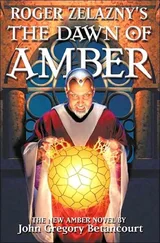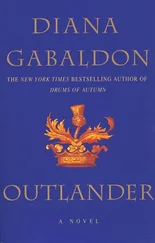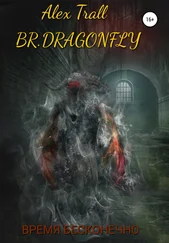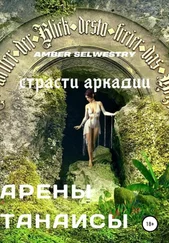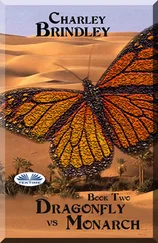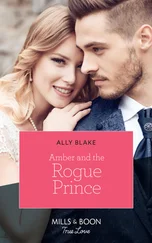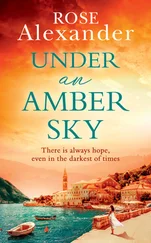“Perhaps Raymond was right,” she added in a softer tone; “it’s only the essence of a thing that counts. When time strips everything else away, it’s only the hardness of the bone that’s left.”
“I suppose you must feel some bitterness against the historians,” Roger ventured. “All the writers who got it wrong – made him out a hero. I mean, you can’t go anywhere in the Highlands without seeing the Bonnie Prince on toffee tins and souvenir tourist mugs.”
Claire shook her head, gazing off in the distance. The evening mist was growing heavier, the bushes beginning to drip again from the tips of their leaves.
“Not the historians. No, not them. Their greatest crime is that they presume to know what happened, how things come about, when they have only what the past chose to leave behind – for the most part, they think what they were meant to think, and it’s a rare one that sees what really happened, behind the smokescreen of artifacts and paper.”
There was a faint rumble in the distance. The evening passenger train from London, Roger knew. You could hear the whistle from the manse on clear nights.
“No, the fault lies with the artists,” Claire went on. “The writers, the singers, the tellers of tales. It’s them that take the past and re-create it to their liking. Them that could take a fool and give you back a hero, take a sot and make him a king.”
“Are they all liars, then?” Roger asked. Claire shrugged. In spite of the chilly air, she had taken off the jacket to her suit; the damp molded the cotton shirt to show the fineness of collarbone and shoulder blades.
“Liars?” she asked, “or sorcerers? Do they see the bones in the dust of the earth, see the essence of a thing that was, and clothe it in new flesh, so the plodding beast reemerges as a fabulous monster?”
“And are they wrong to do it, then?” Roger asked. The rail bridge trembled as the Flying Scotsman hit the switch below. The wavering white letters shook with vibration – FREE SCOTLAND.
Claire stared upward at the letters, her face lit by fugitive starlight.
“You still don’t understand, do you?” she said. She was irritated, but the husky voice didn’t rise above its normal level.
“You don’t know why,” she said. “You don’t know, and I don’t know, and we never will know. Can’t you see? You don’t know, because you can’t say what the end is – there isn’t any end. You can’t say, ‘This particular event’ was ‘destined’ to happen, and therefore all these other things happened. What Charles did to the people of Scotland – was that the ‘thing’ that had to happen? Or was it ‘meant’ to happen as it did, and Charles’s real purpose was to be what he is now – a figurehead, an icon? Without him, would Scotland have endured two hundred years of union with England, and still – still ” – she waved a hand at the sprawling letters overhead – “have kept its own identity?”
“I don’t know!” said Roger, having to shout as the swinging searchlight lit the trees and track, and the train roared over the bridge above them.
There was a solid minute of clash and roar, earthshaking noise that held them rooted to the spot. Then at last it was past, and the clatter died to a lonely crying wail as the red light of the end car swept out of sight beyond them.
“Well, that’s the hell of it, isn’t it?” she said, turning away. “You never know , but you have to act anyway, don’t you?”
She spread her hands suddenly, flexing the strong fingers so her rings flashed in the light.
“You learn it when you become a doctor. Not in school – that isn’t where you learn, in any case – but when you lay your hands on people and presume to heal them. There are so many there, beyond your reach. So many you can never touch, so many whose essence you can’t find, so many who slip through your fingers. But you can’t think about them. The only thing you can do – the only thing – is to try for the one who’s in front of you. Act as though this one patient is the only person in the world – because to do otherwise is to lose that one, too. One at a time, that’s all you can do. And you learn not to despair over all the ones you can’t help, but only to do what you can.”
She turned back to him, face haggard with fatigue, but eyes glowing with the rain-light, spangles of water caught in the tangles of her hair. Her hand rested on Roger’s arm, compelling as the wind that fills a boat’s sail and drives it on.
“Let’s go back to the manse, Roger,” she said. “I have something particular to tell you.”
Claire was quiet on the walk back to the manse, avoiding Roger’s tentative queries. She refused his proffered arm, walking alone, head down in thought. Not as though she were making up her mind, Roger thought; she had already done that. She was deciding what to say.
Roger himself was wondering. The quiet gave him respite from the turmoil of the day’s revelations – enough to wonder precisely why Claire had chosen to include him in them. She could easily have told Brianna alone, had she wished to. Was it only that she had feared what Brianna’s reaction to the story might be, and been reluctant to meet it alone? Or had she gambled that he would – as he had – believe her, and thus sought to enlist him as an ally in the cause of truth – her truth, and Brianna’s?
His curiosity had reached near boiling point by the time they reached the manse. Still, there was work to do first; together, they unloaded one of the tallest bookshelves, and pushed it in front of the shattered window, shutting out the cold night air.
Flushed from the exertion, Claire sat down on the sofa while he went to pour a pair of whiskies from the small drinks-table in the corner. When Mrs. Graham had been alive, she had always brought drinks on a tray, properly napkined, doilied, and adorned with accompanying biscuits. Fiona, if allowed, would willingly have done the same, but Roger much preferred the simplicity of pouring his own drink in solitude.
Claire thanked him, sipped from the glass, then set it down and looked up at him, tired but composed.
“You’ll likely be wondering why I wanted you to hear the whole story,” she said, with that unnerving ability to see into his thoughts.
“There were two reasons. I’ll tell you the second presently, but as for the first, I thought you had some right to hear it.”
“Me? What right?”
The golden eyes were direct, unsettling as a leopard’s guileless stare. “The same as Brianna. The right to know who you are.” She moved across the room to the far wall. It was cork-lined from floor to ceiling, encrusted with layers of photographs, charts, notes, stray visiting cards, old parish schedules, spare keys, and other bits of rubbish pinned to the cork.
“I remember this wall.” Claire smiled, touching a picture of Prize Day at the local grammar school. “Did your father ever take anything off it?”
Roger shook his head, bewildered. “No, I don’t believe he did. He always said he could never find things put away in drawers; if it was anything important, he wanted it in plain sight.”
“Then it’s likely still here. He thought it was important.”
Reaching up, she began to thumb lightly through the overlapping layers, gently separating the yellowed papers.
“This one, I think,” she murmured, after some riffling back and forth. Reaching far up under the detritus of sermon notes and car-wash tickets, she detached a single sheet of paper and laid it on the desk.
“Why, it’s my family tree,” Roger said in surprise. “I haven’t seen that old thing in years. And never paid any attention to it when I did see it, either,” he added. “If you’re going to tell me I’m adopted, I already know that.”
Читать дальше
